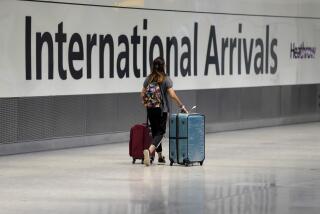Bush Works to Get a Point Across: Time for Life to Return to Normal
- Share via
WASHINGTON — Seeking to set an example for the rest of the nation, President Bush in recent days has left the White House for a restaurant dinner (Tex-Mex in a Virginia suburb), traveled to Chicago (albeit aboard Air Force One) and resumed his familiar, teasing patter with reporters.
Is this how we run a war? Yes, given the administration’s concern about the nation’s precarious economy. In an effort to get Americans to return to their normal lives--and resume their previous spending patterns--Bush is trying to reestablish his own normal routine.
He is, to be sure, meeting almost daily with the National Security Council and tracking the investigation into the Sept. 11 terror attacks.
But Cabinet members are once again traveling around the country; eight took regularly scheduled commercial flights to various destinations on Friday. The administration, in fact, went out of its way to publicize the travel plans.
Still, it is a difficult balancing act for Bush.
The president and his aides are counting on American consumers to boost the economy by feeling confident enough to go out and spend. But they don’t want Americans to lose their sense of outrage over the attacks.
“He’s in a very tricky position as far as that elusive entity we call consumer confidence is concerned,” said Jackson Lears, a cultural historian at Rutgers University in New Jersey. “Bush and the other [administration] leaders have to promote confidence, whether or not they feel it themselves. They have to persuade the public there is nothing to be afraid of. But there’s the danger of encouraging indifference and not maintaining the state of readiness.”
For several days, Bush has been using events in the White House Rose Garden or other settings to try to boost Americans’ confidence, making the point that while the country faces an extraordinary challenge, life can also return largely to normal.
With United and American Airlines passenger jets providing a big-stage backdrop, the president on Thursday told airline workers at O’Hare International Airport in Chicago that one of his goals in the campaign against terrorism is to tell would-be travelers: “Get on board. Do your business around the country. Fly and enjoy America’s great destination spots. Get down to Disney World in Florida. Take your families and enjoy life, the way we want it to be enjoyed.”
But Bush finds himself caught in a modern irony, in which the demands of the economy run at cross-purposes to the demands of a national security crisis--a reversal of the bailout from the Great Depression that World War II helped provide for the U.S. economy six decades ago.
“It is,” said Lears, “one of the real paradoxical concepts of living in a market economy and consumer culture that depends on people maintaining a state of optimism.” Such an attitude, he added, “runs counter to the wartime mentality that they also need. It’s not clear what the sacrifices we hear about are meant to be, if the next thing we hear is a call to go out and head for Disney World.”
Bush hasn’t headed for Disney World. But in small ways, he has signaled that as the country moves day by day beyond Sept. 11, his own life is taking on more of its past pattern.
At a Friday photo session, he happily informed a reporter for Bloomberg news service with whom he had been jogging in Florida just hours before the attacks that he had recently turned in a 21-minute, 45-second performance. That would be an admirable average pace of 7 minutes, 15 seconds per mile for his usual three-mile run.
During the same photo session, with King Abdullah II of Jordan, he called first on Deborah Charles, a Reuters reporter leaving the White House assignment. “You’re after the retirement lady,” he said to another reporter, establishing the order of questions. Explaining the designation he had assigned Charles, who is far from retirement, he added: “Once you leave the White House, we view it as retirement.”
In Chicago the day before, he teased Mayor Richard M. Daley, with whom he was about to spend an hour at a diner, “The mayor said he’s going to buy me lunch today. I like my cheeseburger medium.”
And on Wednesday, before he crossed the Potomac River to visit CIA headquarters in Langley, Va., he took time to roll a ball to his two dogs on the White House putting green.
The change in tone--from his speech to Congress last week that was widely credited as the best he has delivered, to the Texas twang of his chatter with the media--prompted Leo Ribuffo, a history professor at George Washington University, to say: “He’s gone from Franklin Roosevelt to Bubba.”
Ribuffo also said the political dialogue itself has returned to a more normal footing. “The political leaders are back to spouting formulaic responses. The talk shows are back to, ‘Is he up or down?’ And the stunned seriousness has gone from the [news] coverage.”
But, he added, “If there is another attack, normalcy and patience are gone.”
More to Read
Get the L.A. Times Politics newsletter
Deeply reported insights into legislation, politics and policy from Sacramento, Washington and beyond. In your inbox twice per week.
You may occasionally receive promotional content from the Los Angeles Times.










